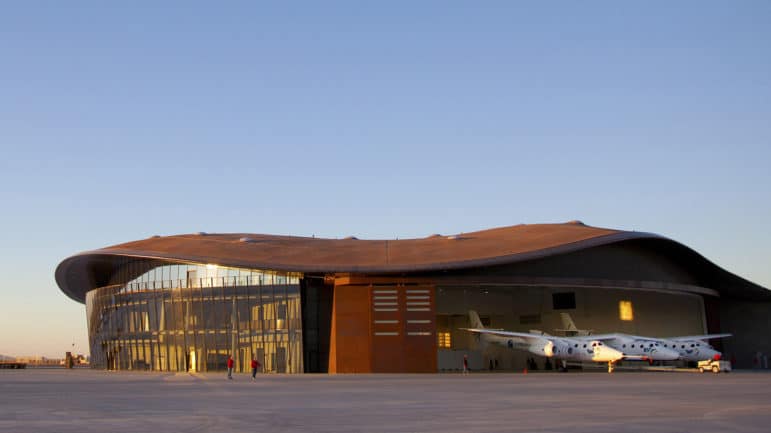
Courtesy photo
Virgin Galactic’s hangar at Spaceport America.
A Senate committee voted Tuesday to advance a bill that would grant more secrecy to Spaceport America, the $220 million state facility near Truth or Consequences originally pitched as a hub for space tourism but which critics argue is a boondoggle.
Spaceport America has pushed in recent years for a carve-out in the state’s open records law, arguing it is crucial to compete for business in a high-tech industry that prizes privacy.
Some members of the Senate Public Affairs Committee raised concerns, however, about creating exemptions for the spaceport, which was built with public funds. And their vote came despite a caution from the state’s main government transparency group, which argued the proposed law is too broad, potentially leaving taxpayers in the dark about New Mexico’s investment in the new space race.
Senate Bill 98 says information about the facility’s customers — spaceflight companies or engineering firms, for example — would be confidential under the Inspection of Public Records Act.
The facility was initially promised during the administration of Gov. Bill Richardson as a platform for turning New Mexico into the hub of space tourism, with wealthy adventurers regularly taking flight from the desert and delivering a boost to the state’s economy.
While those flights have yet to take off in the years since the facility opened in 2011, the space industry has continued to grow and the spaceport has taken on clients in the commercial and research fields.
And officials at Spaceport America say it is a competitive business.
CEO Dan Hicks told the committee that companies might want to keep secret even mundane information, such as the cost or length of a lease agreement.
“It’s a tell to the industry,” he said.
William Burt, a Republican from Alamogordo who is sponsoring the bill with Las Cruces Democrat Mary Kay Papen, told the committee: “[Businesses] won’t come and sign contracts with Spaceport America if they don’t have some assurance.”
Other states that have opened spaceflight facilities have also changed transparency laws to provide some level of secrecy for the industry, they argued. And they maintained Spaceport America’s administration would still be subject to the open records law.
While some legislators once proposed selling off the facility and openly ridiculed it as a boondoggle, there is also an attitude that the state should do whatever it can to make the spaceport a success, regardless of whether the government should have built it in the first place.
But there is still plenty of skepticism and scrutiny of the facility. Shoppers in Doña Ana and Sierra counties still pay a gross receipts tax on their purchases to help cover the cost of developing the facility.
And this latest measure also comes as the facility and its leadership face allegations that they have flouted the state’s open records law.
The El Paso television station KTSM, for example, has complained that the spaceport did not turn over records to back up claims about the facility’s economic impact on the local economy — a subject of debate given the public expense of constructing and operating the site.
Peter St. Cyr, executive director of the New Mexico Foundation for Open Government, argued Spaceport America should view the taxpayers as their investors.
“I know of no other business where investors are cut out of the loop,” he told the committee.
St. Cyr argued the bill is too broad.
Proprietary information that companies want to keep private can already be kept private, he argued. But the measure, he said, would give too much power for private businesses to decide what other information should be kept secret. And the taxpayers deserve to know how their investment is being managed, St. Cyr charged.
Proposals to narrow the bill failed, however.
Sen. Jeff Steinborn, a Democrat from Las Cruces, offered an amendment that would ensure Spaceport America would still have to turn over certain financial information if requested as well as information about threats to the environment and public safety.
The committee did not approve the amendment, however, instead accepting mostly technical changes.
Still, the committee did not exactly endorse the bill, passing it 7-1 without recommendation. Steinborn was the only lawmaker to vote against it.
At one point, Sen. Mimi Stewart, a Democrat from Albuquerque, seemed to sum up the conflicted stance of some on the committee.
“I am concerned it is too broad,” she said of the proposed law. “But I want the spaceport to flourish.”
The bill goes next to the Senate Judiciary Committee. It would head to a vote of the full Senate if that committee advances it.
Contact Andrew Oxford at (505) 986-3093 or aoxford@sfnewmexican.com. Follow him on Twitter at @andrewboxford.